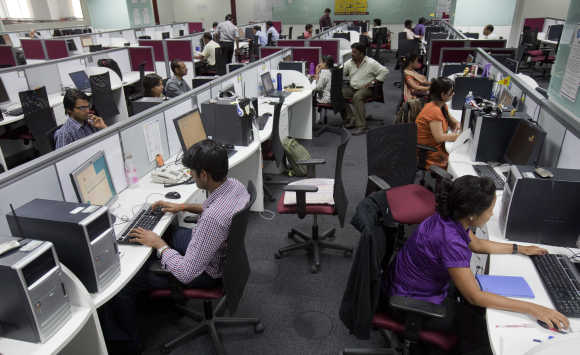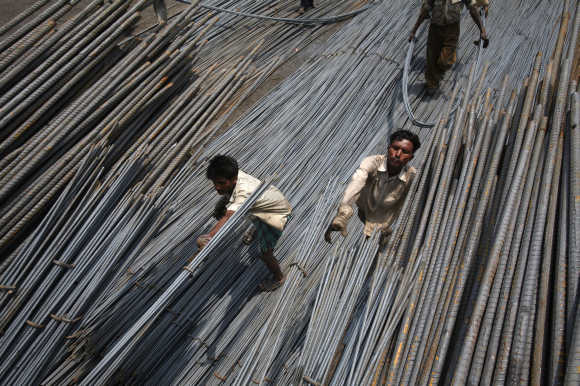 | « Back to article | Print this article |
'Labour laws hampering India's manufacturing sector'
Services cannot create enough jobs that will match the skill sets of the bulk of the Indian work force, says Nirvikar Singh, Professor of Economics at UC Santa Cruz.
Singh, who directs UCSC's Sury Initiative on Global Finance and International Risk Management, and its South Asian Studies Initiative, says the National Manufacturing Policy should focus on making it easier to do business.
Labour laws are hampering the manufacturing sector in India, he tells Faisal Kidwai in an email interview.
Click NEXT to read more...
'Labour laws hampering India's manufacturing sector'
Here are the excerpts:
You have done a detailed study on Indian manufacturing firms. Could you tell us some of the major points that stood out in your research?
We focused on the use and impacts of information technology. Many Indian manufacturing plants do not use information technology, even though it boosts productivity.
Financing constraints for investment appear to be part of the reason. We also conjecture that variations in managerial quality also matter for the differential performance of Indian manufacturing units.
Click NEXT to read more...
'Labour laws hampering India's manufacturing sector'
Some analysts say it's the service and information sectors that will be the key economic players and not the manufacturing sector. They cite the example of the United States where the share of the manufacturing industry is falling. So, how important is the manufacturing sector, especially to a country like India?
Services cannot create enough jobs that will match the skill sets of the bulk of the Indian work force. To generate employment, manufacturing has to grow more rapidly than it has. This has to be labour-intensive manufacturing, not just high-end capital-intensive manufacturing.
Click NEXT to read more...
'Labour laws hampering India's manufacturing sector'
What do you think are the major issues hampering the manufacturing industry in India?
Labour laws are probably at the top of the list. Next is poor infrastructure. Government corruption and harassment, together with policy uncertainty, rounds out the top three reasons.
Click NEXT to read more...
'Labour laws hampering India's manufacturing sector'
Experts doubt that the National Manufacturing Policy will achieve its target of raising the share of manufacturing to 25 per cent of GDP and generating 100 million additional jobs by 2021-22. You have said that the policy lacks focus. In your view, what should be the focus?
The focus should be on making it easier to do business - streamlining and modernising the legislative and regulatory system to reduce the unnecessary costs of doing business. It should be less costly for firms to operate, to grow or to shut down. Improving the national telecoms infrastructure and its transport and energy infrastructure should also be a focus.
Click NEXT to read more...
'Labour laws hampering India's manufacturing sector'
There is a lot of noise in the United States about outsourcing of jobs, including manufacturing, to countries like India. Do you anticipate an increase in protectionism in the US?
I do not think there will be any significant changes in US policy on this front.





